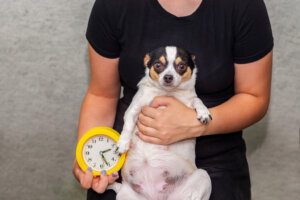Pregnancy Test for Dogs and Confirmation Techniques

A positive result in a pregnancy test for dogs places a great responsibility on the shoulders of her owner. Suddenly, you have to find a home for the puppies, prepare the home for the birth, and get ready for veterinary visits. It’s better to prepare as soon as possible!
But are pregnancy tests for dogs the most commonly used technique? What signs does a dog give when she’s pregnant? Can you tell without the intervention of a veterinarian? This question and many others are answered in this space. Don’t miss a thing!
How to know if a dog is pregnant

Gestation in dogs lasts 58 to 68 days on average. This depends on the breed of the mother (a mastiff will have a longer gestation than a chihuahua). Nevertheless, just like with all mammals, there are signs that you should help you know:
- A bulging belly: the most noticeable physical change.
- Breast swelling: Even if they aren’t full of milk, you will notice that her breasts will swell in the first days of pregnancy. The nipples will turn pink and increase in size.
- Vaginal discharge: This will be clear or pinkish in color.
- The dog spends more time sleeping.
- Mood swings.
- A tendency to isolate herself from other dogs.
- Changes in appetite.
Although many of these signs are early and seemingly unmistakable, remember to always go to the veterinarian. The swelling of the breasts, for example, also appears in pseudo gestation, a condition that should be treated to prevent problems such as pyometra (a uterine infection with purulent discharge). Professional advice is essential.
Methods of detecting pregnancy in dogs
Although you may be able to detect the signs with the naked eye, it’s best to confirm your suspicions with appropriate veterinary techniques. In the following sections, you’ll find the most common ones, which are also the most reliable.
Pregnancy tests for dogs: serology
Serological tests measure the concentration of certain hormones to determine pregnancy in the canine. However, in female dogs, it’s more complicated, as they don’t have a specific hormone that signals ongoing pregnancy (as would be progesterone in humans).
Progesterone, prolactin and other proteins, such as fibrinogen, have been ruled out as indicators, as they’re also present at other times.
The most reliable measure is a follicle-stimulating hormone, which peaks between 16 and 18 days of gestation. An alternative to this is to look at the level of estrogen in the urine, which rises after 21 days post-mating.
Even so, using a pregnancy test for dogs is expensive and unreliable if a 100% reliable diagnosis is needed. Therefore, it’s usually supplemented with other tests such as the ones below.
Palpation
The amniotic sac where each puppy is located can be felt by palpation from 22-30 days of gestation. This method is the cheapest, but must be carried out by a veterinarian to be reliable.
This method only yields valid results in the period mentioned above and towards the end of gestation, because, in the intermediate period, the amniotic sacs fill with fluid and are no longer palpable separately. In obese dogs this method is difficult.
Ultrasonography
From 19-21 days of gestation, it’s possible to detect fetuses with ultrasonography, sometimes from day 25. It’s a minimally invasive, accurate, and quite effective technique to count how many puppies there are, as well as to evaluate their development.
It’s recommended that the bitch comes with a full bladder to facilitate imaging.
Radiography
This technique is used mainly at the end of gestation, when the fetuses already have formed bones. Otherwise, all that can be seen is the distension of the uterus due to the amniotic fluid sacs, which could also indicate problems such as pyometra.
Although it isn’t valid as a pregnancy test for dogs, this test provides information on the number of puppies, their stage of development, or even if any of the little ones have died. Therefore, it’s usually the chosen technique before delivery.
A pregnancy test for bitches: measuring relaxin
Relaxin is a polypeptide hormone whose function is to relax the pelvic ligaments and the birth canal to facilitate the passage of the fetuses, as well as to facilitate the growth of the uterus during gestation. This hormone is produced in the placenta, so it’s the closest thing to a specific hormone for carnivorous mammals during pregnancy.
A few years ago a rapid test for this hormone was marketed, which can also be used at home. However, it should be noted that relaxin is detected 21-30 days after fertilization of the animal. It’s advisable to repeat the test one week after the first one to avoid false negatives.
If in doubt, always consult a veterinarian

Gestation is always a delicate period, which is why many owners decide to castrate the animal. However, if the time comes, always remember that a pregnancy test for dogs isn’t enough; a veterinary follow-up is essential. This is the only way to ensure the health and well-being of the mother and puppies from start to finish.
A positive result in a pregnancy test for dogs places a great responsibility on the shoulders of her owner. Suddenly, you have to find a home for the puppies, prepare the home for the birth, and get ready for veterinary visits. It’s better to prepare as soon as possible!
But are pregnancy tests for dogs the most commonly used technique? What signs does a dog give when she’s pregnant? Can you tell without the intervention of a veterinarian? This question and many others are answered in this space. Don’t miss a thing!
How to know if a dog is pregnant

Gestation in dogs lasts 58 to 68 days on average. This depends on the breed of the mother (a mastiff will have a longer gestation than a chihuahua). Nevertheless, just like with all mammals, there are signs that you should help you know:
- A bulging belly: the most noticeable physical change.
- Breast swelling: Even if they aren’t full of milk, you will notice that her breasts will swell in the first days of pregnancy. The nipples will turn pink and increase in size.
- Vaginal discharge: This will be clear or pinkish in color.
- The dog spends more time sleeping.
- Mood swings.
- A tendency to isolate herself from other dogs.
- Changes in appetite.
Although many of these signs are early and seemingly unmistakable, remember to always go to the veterinarian. The swelling of the breasts, for example, also appears in pseudo gestation, a condition that should be treated to prevent problems such as pyometra (a uterine infection with purulent discharge). Professional advice is essential.
Methods of detecting pregnancy in dogs
Although you may be able to detect the signs with the naked eye, it’s best to confirm your suspicions with appropriate veterinary techniques. In the following sections, you’ll find the most common ones, which are also the most reliable.
Pregnancy tests for dogs: serology
Serological tests measure the concentration of certain hormones to determine pregnancy in the canine. However, in female dogs, it’s more complicated, as they don’t have a specific hormone that signals ongoing pregnancy (as would be progesterone in humans).
Progesterone, prolactin and other proteins, such as fibrinogen, have been ruled out as indicators, as they’re also present at other times.
The most reliable measure is a follicle-stimulating hormone, which peaks between 16 and 18 days of gestation. An alternative to this is to look at the level of estrogen in the urine, which rises after 21 days post-mating.
Even so, using a pregnancy test for dogs is expensive and unreliable if a 100% reliable diagnosis is needed. Therefore, it’s usually supplemented with other tests such as the ones below.
Palpation
The amniotic sac where each puppy is located can be felt by palpation from 22-30 days of gestation. This method is the cheapest, but must be carried out by a veterinarian to be reliable.
This method only yields valid results in the period mentioned above and towards the end of gestation, because, in the intermediate period, the amniotic sacs fill with fluid and are no longer palpable separately. In obese dogs this method is difficult.
Ultrasonography
From 19-21 days of gestation, it’s possible to detect fetuses with ultrasonography, sometimes from day 25. It’s a minimally invasive, accurate, and quite effective technique to count how many puppies there are, as well as to evaluate their development.
It’s recommended that the bitch comes with a full bladder to facilitate imaging.
Radiography
This technique is used mainly at the end of gestation, when the fetuses already have formed bones. Otherwise, all that can be seen is the distension of the uterus due to the amniotic fluid sacs, which could also indicate problems such as pyometra.
Although it isn’t valid as a pregnancy test for dogs, this test provides information on the number of puppies, their stage of development, or even if any of the little ones have died. Therefore, it’s usually the chosen technique before delivery.
A pregnancy test for bitches: measuring relaxin
Relaxin is a polypeptide hormone whose function is to relax the pelvic ligaments and the birth canal to facilitate the passage of the fetuses, as well as to facilitate the growth of the uterus during gestation. This hormone is produced in the placenta, so it’s the closest thing to a specific hormone for carnivorous mammals during pregnancy.
A few years ago a rapid test for this hormone was marketed, which can also be used at home. However, it should be noted that relaxin is detected 21-30 days after fertilization of the animal. It’s advisable to repeat the test one week after the first one to avoid false negatives.
If in doubt, always consult a veterinarian

Gestation is always a delicate period, which is why many owners decide to castrate the animal. However, if the time comes, always remember that a pregnancy test for dogs isn’t enough; a veterinary follow-up is essential. This is the only way to ensure the health and well-being of the mother and puppies from start to finish.
All cited sources were thoroughly reviewed by our team to ensure their quality, reliability, currency, and validity. The bibliography of this article was considered reliable and of academic or scientific accuracy.
- Angulo, S. M. (2006). EL PARTO DE LA PERRA. Profesión veterinaria, 16(63), 34-38.
- Peñalosa Royo, V., & Serrano Serrano, M. Progesteronemia en perras gestantes y viabilidad de la camada.
- Orozco, S. C., Quiroz, V. H., Gómez, L. F., & Villegas, J. P. (2005). Piómetra y gestación simultáneos en una perra: reporte de un caso. Revista Colombiana de Ciencias Pecuarias, 18(2), 176-181.
This text is provided for informational purposes only and does not replace consultation with a professional. If in doubt, consult your specialist.








